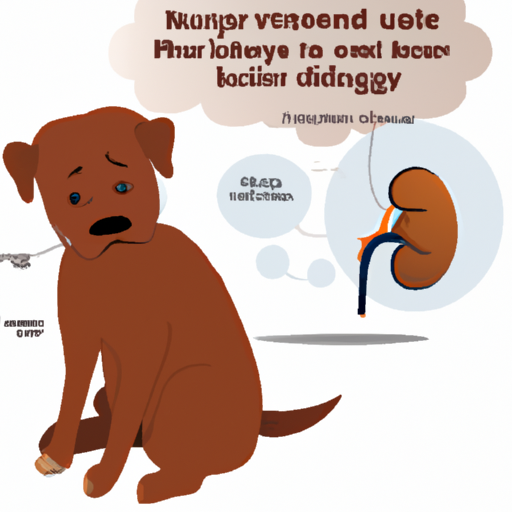As a caregiver, you understand that your dog’s health is a priority. You vigilantly monitor their diet, exercise, and general well-being. However, even with all this care, your precious pet may sometimes fall ill. One such illness that dogs often encounter is kidney failure. Understanding why dogs get kidney failure is crucial in preventing, detecting, and treating this condition.
1. Understanding The Role of Kidneys in a Dog’s Body
Kidneys are vital organs in both humans and dogs. They perform several essential functions:
- Filter waste products from the bloodstream
- Regulate electrolytes
- Maintain proper hydration
- Produce hormones that aid in red blood cell production
When a dog’s kidneys fail, they are unable to perform these functions effectively, leading to a buildup of waste products in the bloodstream. This can cause a variety of symptoms, including loss of appetite, vomiting, and lethargy.
2. Primary Causes of Kidney Failure in Dogs
Understanding why kidney failure occurs requires knowledge of its causes. The condition can be classified into two categories – Acute Kidney Injury (AKI) and Chronic Kidney Disease (CKD).
Acute Kidney Injury (AKI)
AKI is sudden kidney failure that can be caused by:
- Trauma: Major injuries or surgeries can interrupt the blood flow to the kidneys, leading to AKI.
- Toxins: Ingestion of harmful substances such as antifreeze, pesticides, or certain medications can cause immediate kidney damage.
- Infections: Certain bacterial infections can cause inflammation and damage to the kidney.
Chronic Kidney Disease (CKD)
CKD is a long-term condition often caused by:
- Age: As dogs age, their kidney function naturally declines. This is more common in certain breeds such as Dalmatians, Bulldogs, and German Shepherds.
- Genetics: Some dogs are genetically predisposed to kidney disease.
- Other illnesses: Conditions like high blood pressure, cancer, or diseases of the immune system can lead to CKD.
| Kidney Failure Type | Causes |
|---|---|
| Acute Kidney Injury | Trauma, Toxins, Infections |
| Chronic Kidney Disease | Age, Genetics, Other Illnesses |
3. Symptoms of Kidney Failure in Dogs
Early detection of kidney failure can significantly improve your dog’s prognosis. Symptoms to watch out for include:
- Increased thirst and urination
- Loss of appetite
- Weight loss
- Vomiting or diarrhea
- Lethargy
- Bad breath with a chemical odor
- Mouth ulcers
- Pale gums
4. Diagnosis and Treatment of Kidney Failure in Dogs
If you suspect your dog is suffering from kidney failure, you should consult your veterinarian immediately. They will perform a series of tests including blood tests, urinalysis, and possibly an ultrasound or x-ray.
Treatment depends on the severity and type of kidney failure. For AKI, addressing the underlying cause, such as removing the source of a toxin, and supportive care like fluid therapy can often reverse the condition. For CKD, the focus is on managing the disease and improving quality of life. This includes:
- Special diets low in protein and phosphorus
- Medications to control symptoms
- Regular monitoring of kidney function
5. FAQ on Kidney Failure in Dogs
Q: Can a dog recover from kidney failure?
A: Yes, with early detection and appropriate treatment, dogs can often recover from Acute Kidney Injury. However, Chronic Kidney Disease is a progressive illness that cannot be cured, but its symptoms can be managed to improve the dog’s quality of life.
Q: Is kidney failure painful in dogs?
A: Kidney failure itself isn’t painful. However, the accompanying symptoms like mouth ulcers and the general feeling of illness can cause discomfort.
Q: How can I prevent kidney failure in my dog?
A: Regular vet check-ups, a balanced diet, plenty of fresh water, and avoiding toxins can help prevent kidney failure. For older dogs or those at risk, regular kidney function tests can help detect problems early.
Q: Can a dog die suddenly from kidney failure?
A: Sudden death from kidney failure is rare but can occur in severe cases, especially if left untreated. Regular vet visits can help detect and treat kidney issues early.
Understanding why dogs get kidney failure is the first step in ensuring your pet’s health. As a caregiver, your dedication and vigilance can make a significant difference in your dog’s life.



